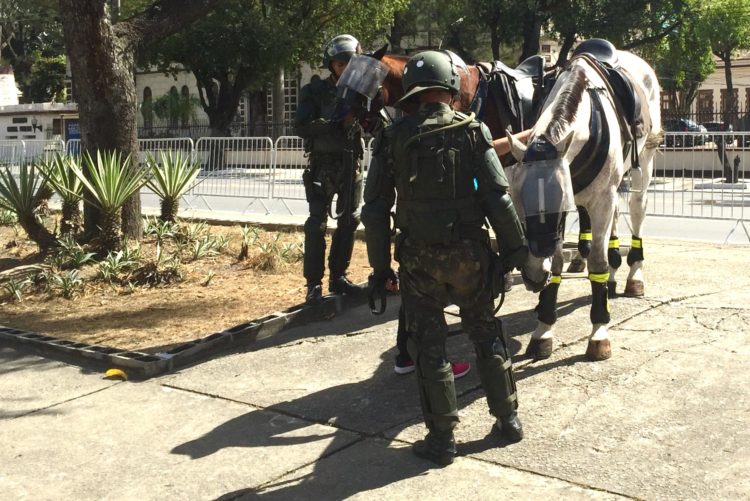Face shields and shin guards. Not the normal attire for the average horse, but it seems to be the outfit of choice for the police horses of the Deodoro Olympic Zone in Rio de Janeiro.
The horses support military personnel patrolling the area between the metro stop and competition venues for equestrian, rugby, field hockey, and other events. In contrast to Olympic equestrian horses, these animals provide some of the strongest illustrations of the highly militarized Rio 2016 Olympic Games.
Nine years ago, in 2007, when the city submitted a bid to host the Olympic Games in competition with Madrid, Tokyo, and Chicago, “Rio, compared to the other cities, had the worst score in safety and security,” said Gabriela de Laurentis, a tourism analyst and researcher with University Unigranrio, in an Aug. 9 presentation. An hour after her presentation for students in a hostel in the Copacabana neighborhood, Brazilian security forces used tear gas to disperse street vendors and protesters a couple of blocks away. Audience members what sounded like rubber bullets being fired, and other sounds from the protest.
After speaking with citizens of Rio de Janeiro (cariocas, as they happily refer to themselves), a shift in their perspective on security has become evident, but they are not sure how long it will last.
“Now I can even walk and talk on the phone or take pictures in the streets downtown. It’s awesome,” said Sonia Rodrigues, a local entrepreneur.
While it would seem that the security and safety of the city has drastically improved, with nearly nine years to work on the issue, the changes appear segregated to the areas hosting Olympic events. “It’s a smokescreen that we are showing the rest of the world,” said Daniel Grazera, director of CineBikeFood. “If you go to a community removed from the Olympic areas, you’ll see the chaos of what is actually happening in the city.”
With 85,000 troops patrolling the streets of Rio and more than 3,000 personnel – many of them military — acting as Olympic security check screeners, changes in city security allow for more freedom on a social level. The 85,000 troops are almost double the military presence of the London 2012 Olympic Games. However, the freedoms of carioca street vendors appear diminished due to heightened security. When vendors lost their ability to sell food on the streets, the CineBikeFood organization created a central building where they could park their bicycles and sell products inside. “Since we are near the Olympic Boulevard, we gathered food bikes that belong to people who couldn’t get a permit to sell on the street,” said Grazera.
A few days before the opening ceremonies, Brazilian government officials terminated a contract with Artel to supply security screeners at Olympic venues, due to Artel’s inability to fulfill their end of the contract to recruit and hire the people. The Brazilian government used troops instead.
While there are some cariocas, like Daniel Grazera, who are disenchanted with the front that Rio has put up, others have gotten caught up in the Olympic spirit. “The Olympic mood has been spreading among us, said carioca Giovanna, in a video interview on Olympic Boulevard in central Rio. “We are holding a really important competition in Latin America for the first time. In the end, the positive side is the one that has to prevail.”
Luis Ottoni, a journalism major at Mackenzie Presbyterian University in São Paulo, Brazil, served as Portuguese translator and Rio field producer on this story.

Photo: Security forces in the Deodoro Olympic Zone at the Rio 2016 Olympic Games.

